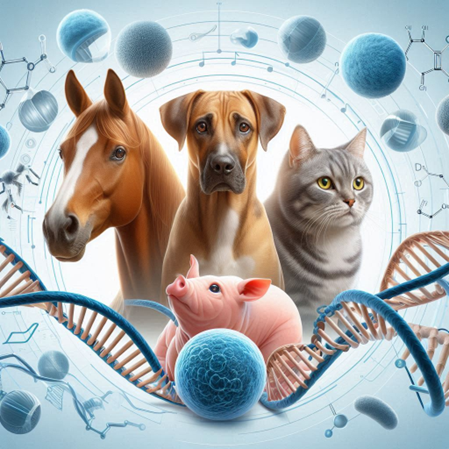
Solving the puzzle: Let your pet’s DNA do the talking
Share
What is it about?
We all know about DNA, right? It’s the stuff that the cops in the TV shows use to figure out who did it…. Yes, that is one way to use DNA analysis – it gives you an exact “fingerprint” of the person (or animal!) to which it belongs, and is therefore very useful in finding the suspect!
But what exactly is DNA? In simple terms, it is a “code” that is unique for each individual – a chemical molecule that is used as a blueprint every time that a protein is made by your body. Proteins form part of everything that you are. DNA is inherited from your parents – the unique code from each parent is mixed together to form your own unique code and, therefore, your body’s unique characteristics or “traits”.
How does it help?
OK, so after all that science, how can it help you to understand and better care for your animal? If you were able to see the DNA in a cell, you would be able to know almost everything about an animal. You can figure out who the parents are, but also what diseases it is likely to develop. And this, in turn, helps you to manage your pet in the best way possible. It helps you to give your dog the best environment and diet so that it can live a healthy and happy life, and also helps you to look out for early signs of disease so that you can address it.
DNA analysis can reveal the unique DNA code that is hidden away in your animal’s cells and, luckily, it is becoming easier for pet owners to have such tests done. While some tests still require your veterinarian’s help to decide on the correct test and collect the correct sample, some tests are available to pet owners directly. All that is required is for you to collect a sample from your pet, put it in the mail, and wait for the results. Your DNA service provider will provide you with a full report, explaining all that the DNA revealed.
Ready to unravel the mysteries? Read more and to order your test from EasyDNA. They offer, amongst others, the following for cats, dogs, horses, and other animals:
Paternity testing – whoddunnit?
You may or may not know who the sire of that cute bundle of puppies is. Maybe you have more than one dog on the premises, or maybe the neigbour’s dog has been by far too interested in what is happening in your yard. If you have access to the suspects, you can now do a very easy do-it-yourself test to determine the culprit – using the parentage test. And if you are a breeder, this is a good way to put the minds of your clients at ease as to who they are buying.
For the mixed grills
Your adopted or stray dog may look like a mixed bag of wonderfulness, but you can now figure out exactly what traits were inherited, and what will be passed on to the next generation – even without the mother. It is a bit more complicated, but the Dog DNA without the mother test can be useful.
What was inherited?
Your purebred dog or cat may be raising its nose at the mixed breeds in the neighbourhood but, given its long lineage of purebreds, it may have inherited some conditions that you would prefer to know about – because, once you do, you can manage your animal better with the help of your veterinarian. And, of course, it may have some traits that you want to pass on to the next generation, or others that you would rather not. Understanding inherited traits may help you choose the appropriate sire or dam. Have a look at the genetic and breed tests, or the various disease tests for dogs, cats, and horses.
Remember to speak with your veterinarian about which tests are worthwhile to figure out disease for your specific animal, and especially how to manage an animal that could be susceptible to specific diseases.
The feathered ones
Wondered whether that cheeky attitude from your parrot is representative of its male or female side? You can now find out by doing DNA sexing for your bird. There is some sample taking involved, so you may want to involve your veterinarian to get that right.
And, finally, for the horse lovers
You can do inherited disease testing, parentage testing and DNA profiles (which could be very helpful if your animal is stolen or lost and found).
To understand these and other tests, follow this link to EasyDNA and let them help you solve the mysteries and ensure happier, healthier animals.